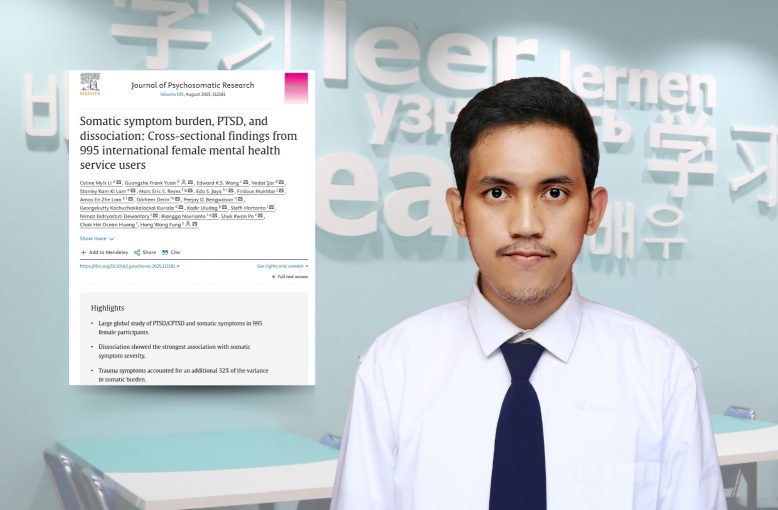
Yogyakarta, June 11, 2025 – A recent study titled “Somatic symptom burden, PTSD, and dissociation: Cross-sectional findings from 995 international female mental health service users” by a team of authors including Celine Mylx Li, …. [Riangga Novrianto] et al., has been published in the Journal of Psychosomatic Research (Vol. 195, Article No. 112181). This Scopus-indexed journal is ranked Q1 with a citation score of 6.7 and an impact factor of 3.5.
Key Findings of the Study:
- A total of 995 women from various countries using mental health services participated in the survey.
- More than 54.9% reported a high somatic symptom burden, measured by SSS-8 ≥ 13.
- The group with high somatic symptoms was twice as likely to screen positive for PTSD/CPTSD (62.6% vs 28.3%) and dissociative symptoms (61.5% vs 16%) compared to the lower-symptom group.
- Regression analysis showed that PTSD, disturbances in self-organization (DSO), and dissociation accounted for an additional 32% of the variance in somatic burden, beyond demographic factors and childhood trauma.
- Logistic models confirmed that PTSD (OR 1.54), DSO (OR 1.67), and dissociation (OR 2.08) were significantly associated with high somatic symptom burden (p < 0.001), with an overall model accuracy of 75.1% and AUC of 0.824.
- Trauma-related symptoms (PTSD, dissociation, DSO) are strongly associated with the severity of somatic symptoms in female mental health service users. This reinforces the importance of trauma-informed approaches in screening and treating somatic symptom disorders.
This research is relevant to SDG 3: Good Health and Well-being, particularly:
- Target 3.4: Reducing mortality from mental disorders, and improving prevention and treatment. The study emphasizes the need for holistic interventions that integrate both physical and psychological aspects in mental health services.
- Target 3.8: Achieving universal access to quality healthcare and reducing the burden of disease. Trauma-informed approaches can enhance the quality of diagnosis and treatment for both somatic and mental disorders.
By adopting trauma-informed care, health services can:
- More accurately identify somatic disorders linked to PTSD or dissociation.
- Provide integrated therapies combining psychological and medical interventions for physical and psychological symptoms.
- Reduce negative impacts such as work absence, social isolation, or unnecessary medical expenses.
Brief Recommendations from This Study:
- Implement routine screening using tools such as SSS-8 and ITQ++MDI for women in mental health clinics.
- Increase training for mental health professionals in trauma-informed care, especially for somatization symptoms.
- Encourage interdisciplinary collaboration between psychiatrists, psychologists, and general practitioners for comprehensive treatment strategies.
This research provides a strong foundation for strengthening the integration of physical and mental health services, aligning with the goals of SDG 3 for holistic and inclusive health.
Abstract
Objective. Somatic symptom burden is frequently linked to trauma-related psychopathology; Yet, the specific contributions of PTSD, disturbances in self-organization (DSO), and dissociation remain underexplored. Our study examined the prevalence of somatic symptom burden among female mental health service users and evaluated the associations between trauma-related symptoms and somatic symptom burden.
Methods. Female participants (N = 995) from international clinical settings completed validated self-report measures assessing somatic symptoms (SSS-8), childhood trauma (BBTS), PTSD and DSO symptoms (ITQ), and dissociation (MDI).
Results. Over half (54.9 %) reported elevated somatic symptom burden (SSS-8 ≥ 13). These individuals were significantly more likely to screen positive for probable ICD-11 PTSD/CPTSD (62.6 % vs 28.3 %), X2 (1) = 116.685, p < 0.001, Φ = 0.34, and report dissociative symptoms (61.5 % vs 16.0 %), X2 (1) = 210.883, p < 0.001, Φ = 0.46, compared to those with lower somatic symptom burden. Hierarchical regression revealed that PTSD, DSO, and dissociation accounted for an additional 32 % of variance in somatic symptom burden beyond demographics and childhood trauma exposure. Logistic regression confirmed that PTSD (OR = 1.54), DSO (OR = 1.67), and dissociation (OR = 2.08) were each significantly associated with elevated somatic symptom burden (all ps < 0.001). The final model demonstrated good classification performance (accuracy = 75.1 %, AUC = 0.824) and significantly outperformed individual symptom models.
Conclusion. Trauma-related symptoms are closely linked to somatic symptoms among female clinical populations. Findings emphasize the need for trauma-informed screening and treatment to effectively identify Somatic Symptom Disorders and manage somatic symptoms in mental health settings.
Keywords: Somatic symptoms; Complex PTSD; Dissociative disorders; Betrayal trauma
Link: https://doi.org/10.1016/j.jpsychores.2025.112181
Based on its keywords, this article is a research output relevant to SDGs 3 & 5.
Congratulations to Mas Riangga and the author team.
Written and edited by: UP & Public Relations Team
